Copyright ©2007 PopEntertainment.com. All rights reserved.
Posted:
August 10, 2007.
For author Neil Gaiman,
seeing his expansive graphic novel Stardust made into a film that is
getting the full-press treatment is a triumph in and of itself though he
initially approached the whole experience with anxiety, if not dread. No
wonder he felt this way for the comic book creator and text novelist has had
his projects go awry in the past (witness the TV adaptation of Neverwhere),
enough so that he has become both producer of films such as Stardust,
but also a screenwriter and director as well.
The English-born
46-year old father of three first established his reputation and fan base by
helping to revamp the concept of graphic novel with a strong sense of the
mythic and vision of a personal mythology. That and a strong sense of humor
helped make such series as "Sandman," "The Books of Magic," and "Stardust"
such seminal texts for graphic story fans.
The Minneapolis-based
Gaiman has also written sci-fi inspired novels such as American Gods
and Anansi Boys, voiced audiobooks, and even relaunched other great
comics such as the late Jack Kirby's series "The Eternals" for Marvel
Comics, winning various awards in the comic and sci-fi fields along the way.
Now Stardust the grand coming-of-age story of a teenager, Tristan
(Charlie Cox), who tries to win the cold-hearted Victoria (Sienna Miler) by
bringing her a star (played by Claire Danes) that falls in the land of
Stormhold offers a broad tapestry that should attract a lot more than
Gaiman's cult fandom.
What is the spirit or
the heart of
Stardust? What made it work for you as a book and what makes it work for
you now, as a movie?
Stardust,
for me, is about a boy becoming a man. It's about that classic fairy-tale
thing of setting out to find something, to prove yourself. But it's also
about that life thing discovering that the thing you set out to find is
very often not the thing you thought you were going to find. Going out on an
adventure, whether in life or in fiction, changes you, and that for me was
always the heart of Stardust when I was writing it.
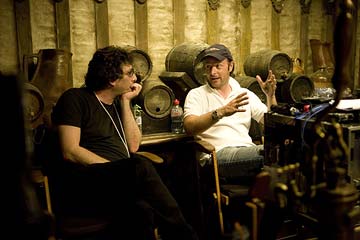 I wanted to write a
story about a young man who sets out to find his heart's desire, and [finds]
it wasn't what he thought it was. What we've done with the film is
compressed [the story] and squeezed it, we've occasionally done filmic
versions of things I'd done in the book, and we changed the ending, which is
something I knew we would have to do when I sold it to Miramax back in
1999.
I wanted to write a
story about a young man who sets out to find his heart's desire, and [finds]
it wasn't what he thought it was. What we've done with the film is
compressed [the story] and squeezed it, we've occasionally done filmic
versions of things I'd done in the book, and we changed the ending, which is
something I knew we would have to do when I sold it to Miramax back in
1999.
As an author, I loved
writing the end of the original novel because it's enormously fun, its
filled with lots of people missing each other and things that never hit in
the way you expected them to. And it's enormous fun for a reader, who is
seeing everything from above and knows more about everything that's been
happening than the characters do. But I realized even then it could be
incredibly frustrating to have that ending happen if you were a viewer of a
film, because you'll be sitting there and expect all these characters to
meet at the end and then they all miss each other and you go, "WHAT?! What
the fuck was that about?!"
In making this
transition to the film, have you been able to maintain a degree of control
or input, or at one point do you relinquish that and get to see what they
do?
Unless you're actually
both directing and completely funding the film that you're making, you will
have to relinquish control. But what I tried to do with Stardust was
figure out a way that would allow me to get a film that I was happy with
made. Having gone through various incarnations of the Hollywood experience
now, I've sort of learned things you don't do.
"Stardust" itself was
first bought for the movies by Miramax in about 1998, '99, and went through
an unsatisfactory development period, and eventually I got the rights back
and just went, "I'm never going to do that again." And so for the following
several years, people come to me and said, "We want to do a Stardust
film," and it would be directors or it would be beautiful young actresses
who viewed it as a staring vehicle for themselves, and I would simply say
no, driving my poor agent mad. And I continued to say no until I started
talking with [producer, director and co-screenwriter] Matthew Vaughn about
it.
I'd already worked
with Matthew on one project [in which] we reached a point, very briefly,
where we had a small impasse where his producers wanted him to do one thing
but we'd agreed to another. It was just a handshake deal. For about a
morning he was ready to do what his producers were doing and then filled me
[in] and said, "That's not what we agreed to do, and I'm going to stick with
what we agreed to do. I keep my promises." And although I don't think he
knew it at that time, that was what got him Stardust. I thought
that's really weird, a Hollywood producing entity who actually keeps his
word. A few weeks ago I was asking a screenwriter friend about a producer
whom he'd worked with, who got in touch with me about something, and I said,
"Is he trustworthy?" And [my friend] said, "You're asking me if a producer
is trustworthy. Isn't that rather like asking is this lion a vegetarian?"
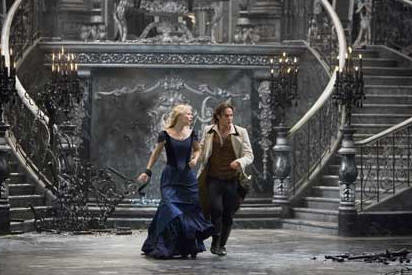 But in Matthew's case
he was completely trustworthy, and that already had me interested. We talked
briefly, he and I, with Terry Gilliam about doing Stardust, and Terry
had just come off The Brothers Grimm (2005) and wasn't going to go
back to fairy tales for all the tea in China. And then the next thing I
knew, Matthew, completely unplanned, ended up directing Layer Cake
(2004) and then went off to do X-Men: The Last Stand (2006), and
walked off X-Men, went back to England, and I got a phone call from
him saying, "I want to do Stardust, what do you say? We'll do it
together." And I thought about it for all of about 30 seconds and I said
yes. Okay. I went out and found him a screenwriter [since] I knew I didn't
want to write it myself, and also knew I wanted a screenwriter who I could
trust to get the material and who would complement Matthew.
But in Matthew's case
he was completely trustworthy, and that already had me interested. We talked
briefly, he and I, with Terry Gilliam about doing Stardust, and Terry
had just come off The Brothers Grimm (2005) and wasn't going to go
back to fairy tales for all the tea in China. And then the next thing I
knew, Matthew, completely unplanned, ended up directing Layer Cake
(2004) and then went off to do X-Men: The Last Stand (2006), and
walked off X-Men, went back to England, and I got a phone call from
him saying, "I want to do Stardust, what do you say? We'll do it
together." And I thought about it for all of about 30 seconds and I said
yes. Okay. I went out and found him a screenwriter [since] I knew I didn't
want to write it myself, and also knew I wanted a screenwriter who I could
trust to get the material and who would complement Matthew.
Matthew is very
upfront about the fact that he is pretty much a sort of boys' director, and
what he loves and understands is the action stuff and the bouncing around,
and I think he's better now but definitely going in on this he was much
less comfortable with things like human relationships and love and all that
kind of stuff. So I wanted to find somebody who really did have that, and
that was Jane [Goldman]. After that my role mostly consisted of reading
drafts and saying, "I wouldn't do that if I were you."
At one point in
November, two years ago, I flew over when we had a draft that was pretty
much a shooting script, and Jane and Matthew and I sat in Matthew's study
and Jane and I read the script out loud, trying to do it in a world in which
I took males parts and she took female parts. But it didn't always work like
that, and that was really educational because at that point there were a lot
of places were I said, "You really don't want to do this because
" or, "Have
you thought about doing this?"
Some of the things I
wanted him to change I was wrong about. There were battles that he won
because he was the director which was absolutely the way they should be;
it's his film. But at the end of the day I was incredibly glad with the film
that we made. There were things that weren't there because the budget wasn't
with us, but pretty much it's the film that we both agreed needed to be
made.
I did the [audiobook]
for "Stardust" a couple years ago, and one of the things I learned doing
that, that if you read "Stardust" out loud it's 10½ hours long, so
immediately you get to the point of, "How can I compress this?" If you made
the film, not only would it be 10½ hours long, but the hero wouldn't be born
till a half-hour in. So how do we get him born pre-credits?
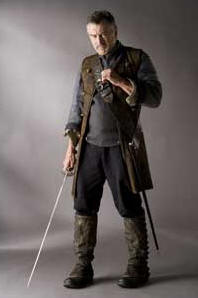 Did you ever think
you'd get actors like Robert DeNiro or Michelle Pfeiffer as part of the
cast, and did you have anybody in mind to play those roles?
Did you ever think
you'd get actors like Robert DeNiro or Michelle Pfeiffer as part of the
cast, and did you have anybody in mind to play those roles?
Was I surprised?
Absolutely, gob-smacked. I think the last couple years the casting fairy
definitely has been with me, both with [Stardust] and Beowulf
[currently in post-production and for which he co-wrote screenplay]. But
with Beowulf it even got weirder because I just remember sitting
there with [executive producer and co-screenwriter] Roger Avary and
[director] Bob Zemeckis making up our dream cast in March, and then the
following November they were all there, and we're going, "This is really,
really weird."
But no, with people
like Michelle Pfeiffer [who plays the witch Lamia in Stardust] you
don't sit there going, "We will get Michelle Pfeiffer to play the Witch,"
you sit there going, "We will get someone cool and scary and witchy to play
the witch, I wonder who it will be?" And to be honest, I was just as happy
with the unknowns; there is some lovely, wonderful casting in there. Charlie
Cox [who plays the lead role of Tristan] is absolutely unknown, but he's one
of my favorite things in there watching him go from awkward, nerdy boy to
confident hero. He does it so well, you almost forget how amazingly nerdy
and irritating he is in the beginning. For me, it's all about the
performances. I didn't sit there going, "Oh my gosh! We got DeNiro!" Even
when we got DeNiro I asked how is this going to work? Is this going to be
good? I was relieved when it was.
Is there any downside
for you in seeing your creations onscreen?
Yeah, if its bad, it
can be really bad, you know. Over ten years ago I [wrote the original
miniseries script] Neverwhere (1996) for the BBC, and [it] was sort
of mocked up by the BBC in every possible way. From costume, to cast, to the
way it was shot, to, you know? Everything. That actually wound up producing
the novel for me, because I was so irritated with the TV series, it was
like, "No! That's not what I meant," and I went off and wrote the novel.
With Stardust,
I remember I was holding my breath, and I didn't know I was holding my
breath until about two weeks before they finished shooting, and Charles Vess
[the artist of original graphic novel] and I went over to the set. I'd been
there until they started shooting and then I had to go off to Australia. I
just wound up with a full calendar and so I missed DeNiro, I missed a lot of
his stuff. Now I was flying in and they had about half an hour of raw
footage for Charles and me to see. I was terrified and I didn't know how
terrified I was until I saw it and loved it and breathed out this huge sigh
of relief and said, "Okay, it's my thing, it's lovely."
 It's very, very weird
being the author of the book anyway, because, really, what you want for a
film is for everyone to see it. You want everyone to love it. You want
people to tell their friends, to go back again and come up to you on the
street and say, "By the way I saw your film, Stardust, and loved it.
It was so moving and Michelle was so scary and DeNiro was so funny and, oh
my gosh, Charlie Cox
I loved it and I'm going to see it again and buy the
DVD. But the book was better." And that's really what you want.
It's very, very weird
being the author of the book anyway, because, really, what you want for a
film is for everyone to see it. You want everyone to love it. You want
people to tell their friends, to go back again and come up to you on the
street and say, "By the way I saw your film, Stardust, and loved it.
It was so moving and Michelle was so scary and DeNiro was so funny and, oh
my gosh, Charlie Cox
I loved it and I'm going to see it again and buy the
DVD. But the book was better." And that's really what you want.
Now that you're
going to become a director, you really can't say that.
Oh, I can always say
that! But you know, books and films are so different. Films occur in real
time. They are one experience. They take two hours to happen. They play out
and you see things and learn things. With a book, you have this peculiar
experience in the back of somebody's head. You know, you've written
something, but you've only used words and now they are making their own film
[in their head]. If it's good, it's better than anything you could ever
make. I love directing stuff and making films. I love that process. As a
writer and producer as well it's magic but for me books are kind of
perfect because they involve no compromises at all.
In Stardust,
there really weren't a lot of compromises. But, for example, in a place
where, a week before we started shooting, we had to grit our teeth and go,
"Okay, we got the lion and the unicorn having a battle in here, and Tristan
saves the unicorn. That is how the unicorn comes into the plot and it's
going to cost us $1.9 million and will last roughly 90 seconds. We don't
have that money to spend at that point what are we going to do? And
suddenly the unicorn wanders into the story [instead]. Every time I see that
unicorn I think if we only had [an additional] 1.9 million dollars.
Were there any
surprises for you when you saw the finished movie?
There were. There were
lots of surprises. In particular, there were things that I didn't know how
well they were going to work. And there were things I had been worried about
in reading the script if not worried, then at least slightly trepidatious.
[ed note: "trepidatious" is not a word, it is assumed he means "feeling
trepidation"]
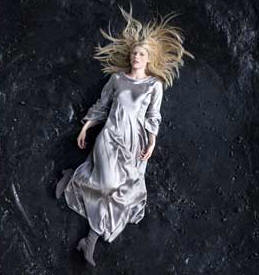 The guard on the wall
was one of them: I read the script and said, "Hang on, you know, he's this
old man and been on the wall, and in the book I have young men from the
village working in shifts of two who come in and blah-blah-blah. But [here]
we just have this one old guy. How is that going to work? Where does he
live, and for God's sake, Matthew, where does he go to the toilet? Let's be
real about this people are going to worry." And then I said, "No, nobody
is going to worry, it makes complete filmic sense."
The guard on the wall
was one of them: I read the script and said, "Hang on, you know, he's this
old man and been on the wall, and in the book I have young men from the
village working in shifts of two who come in and blah-blah-blah. But [here]
we just have this one old guy. How is that going to work? Where does he
live, and for God's sake, Matthew, where does he go to the toilet? Let's be
real about this people are going to worry." And then I said, "No, nobody
is going to worry, it makes complete filmic sense."
And I was nervous
about the DeNiro stuff when I read it in the script I went, "You sure?" And
I could absolutely see why they'd written that from the point of view of the
theme, in terms of being yourself; of not trying to be the person people try
to make you. It's between what you are on the inside and what you seem on
the outside. And it was absolutely great except I read it and said, "This
could be so bad. This has potential to go awfully, awfully wrong. And then
I said, "Alright, no, it's marvelous!" And astonishingly surprised at that."
Since you have several projects in the works,
what have you learned from this experience that you could apply to your own
directing?
I'm not sure. I think
one of them [is] surrounding yourself by people you trust. Right now we are
putting together the Death movie, and it's a very interesting process for
me, putting together people whom I've worked with, trust and could rely on.
The joy of doing Stardust was, it was a bunch of people doing it
[who] trusted each other.
The deal I did with
Matthew is one I would advise any writer not to do. His option on "Stardust"
was free. I got to the point where he wanted to make it. I said okay, and
that was our deal. You don't do that. I would advise anybody not to do that.
I am an old hand in this business, and you don't do that. But I did it
because I trusted him and it worked, and it proved out, and I did it because
[of what we went] through four years earlier when I was making my John
Bolton movie [the half-hour documentary "A Short Film About John Bolton"
(2003), which Gaiman wrote and directed and Vaughn produced] and I realized
this is someone who I could really trust and work with. But you don't do
that. You make them give you millions of dollars and stuff. It may not keep
them honest, but it means they have money, they risk it, they screw up.
Are you still
working on the adaptation of Nicholson Baker's novel
Fermata? Word
has it that it's pornographic. Is it possible to make it palatable for
mainstream audiences?
I don't know, I think
the script that I did for Bob Zemeckis in that case was palatable, concerns
mostly of the film [Cashback] made recently in the UK that used a lot of the
techniques we were going to use about stopping time and undressing women and
things bizarre. We are now waiting to see what will happen with that film.
But I don't know, it was a real interesting challenge. What I tried to do
when I wrote the script for Bob, was instead of writing a script about
somebody who cannot connect with women in real time and is undressing them
and masturbating on them, it is now more about somebody who can not connect
with women or anyone else for that matter who is stopping time and freezing
it and observing it. It was like Annie Hall with time stopping. But I
don't know if Bob will do it or not. Its up to him. It's his film and I
wrote the script for him.
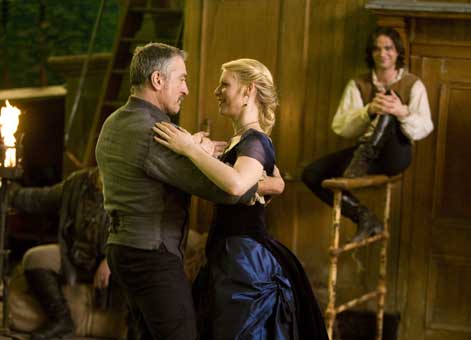 Given your acceptance
of the changes that were made to
Stardust, how would
you respond to someone like ["Watchmen" creator and acclaimed comics writer]
Alan Moore, who freaked out over changes that were made in films created
from his comics?
Given your acceptance
of the changes that were made to
Stardust, how would
you respond to someone like ["Watchmen" creator and acclaimed comics writer]
Alan Moore, who freaked out over changes that were made in films created
from his comics?
Alan was not involved,
and to be honest, part of the way I got involved in making Stardust
was from watching Alan, who's been one of my closest friends for an
embarrassing number of years now, maybe 22, 23 years. But watching Alan with
things like [the graphic-novel adaptations] of The League of
Extraordinary Gentleman (2003) and From Hell (2001), it was
really a lot like watching someone walk across the minefield ahead of you.
Alan's perspective and philosophy was, "I've made the comic. It's as good as
I could have possibly make it. I have no interest in the film. Give me a
check, good, go make your film and maybe I'll catch it on DVD sometime."
That was Alan's
philosophy, and what he wound up with were three films he was unhappy with.
Two he was really, really unhappy with. Then halfway through the third film
[V for Vendetta (2005)], he just sort of broke, and gave all the
money away and everything away. [He] really didn't want anything to do with
anymore and was really upset. And I thought, "Well, I don't want that to
happen."
I don't want to be in
a universe were I say, "Okay, go make the film. It has nothing to do with
me," and then be miserable about it, because that really didn't work with
Alan. As a result I wound up with getting much, much more involved. That's
why I was a producer on this. That's why I worked with Matthew. That's why I
found Jane. That's why I wanted a film I could go to and be happy about.
When The League of
Extraordinary Gentleman came out, you had a large number of reviewers
beginning their reviews by saying, "This is a really bad film based on a
really good comic." I do not want a lot of reviews that say, "This is a
really bad film based on a really good book." Call me selfish, but I wanted
something I could be proud of. I didn't want to get to the point were [I] do
what Alan did, which is walk off in an enormous huff and just go, "I don't
want to play anymore."
What are your
thoughts on what has happened over the past ten to fifteen years with
graphic novels being adapted to films, and the legitimacy now of graphic
novels or comic books as a source of serious literature?
I think they have
nothing to do with each other. I think you have two things there that have
absolutely nothing to do with each other. On the one hand, you have the
growing recognition of legitimacy of work done in comic form, which honestly
I think has so much to do with what people like Alan Moore, Frank Miller and
Art Spiegelman were doing in 1986. I was a journalist back then. I was
trying to get articles published on comics and it was almost impossible. You
had a generation of editors who were just trying to quash it, and had no
interest.
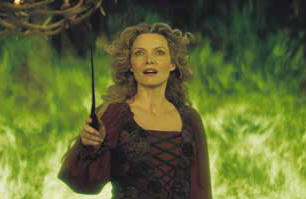 Now you have a
generation that was in high school or college then and reading this stuff
"Maus" and "Watchmen" and "Swamp Thing." Then they picked up "Sandman" [the
75-issue long Gaiman-scripted Vertigo/DC series] and they are now editing
the literary pages of those newspapers. They are now in charge of the
magazines. It hasn't occurred to them that this stuff that they loved and
felt at the time, quite rightly, was as good as anything else out there was
culturally inferior. I think that's why you can get "Watchmen" on the "50
greatest novels of the 20th century" list.
Now you have a
generation that was in high school or college then and reading this stuff
"Maus" and "Watchmen" and "Swamp Thing." Then they picked up "Sandman" [the
75-issue long Gaiman-scripted Vertigo/DC series] and they are now editing
the literary pages of those newspapers. They are now in charge of the
magazines. It hasn't occurred to them that this stuff that they loved and
felt at the time, quite rightly, was as good as anything else out there was
culturally inferior. I think that's why you can get "Watchmen" on the "50
greatest novels of the 20th century" list.
I think the flip side
of it is the whole thing of comics and graphic novels being used as
yogurt-starter for Hollywood films. Which is fine. I don't think it's
terribly important one way or the other, and I find it very difficult and
I know this is the wrong place to say this but I don't feel Hollywood
confers any legitimacy on things. I think things get legitimacy by their own
merits. There are great films out there based on comics, and what's really
odd is [that] lots of people have no idea what's based on comics, including
Road to Perdition. So I think it's good but fundamentally irrelevant.
Hollywood has liked having things as a yogurt-starter Broadway plays and
novels and now comics as well. One day it will be cereal boxes.
Why do you love the
mythic?
I don't know why. I
love the mythic. Mythic has always been, if not my bread and butter, at
least my cup of English breakfast tea. I was the kind of small boy who, when
he got his hands on the "Tales of the Norsemen" [actually "Myths of the
Norsemen" (Puffin Classics) by Roger Lancelyn Green and Alan Langford] aged
about seven, just read it until the pages fell apart. Then I spent my pocket
money on "Tales of Ancient Egypt" and brought it home and puzzled for ages,
because it was by a man called Roger Lancelyn Green and I couldn't figure
out if I put it under the "L" or "G" in my bookcase which tells you so
much more than you need to know about me at age seven.
Email
us Let us
know what you
think.
Features
Return to the features page.